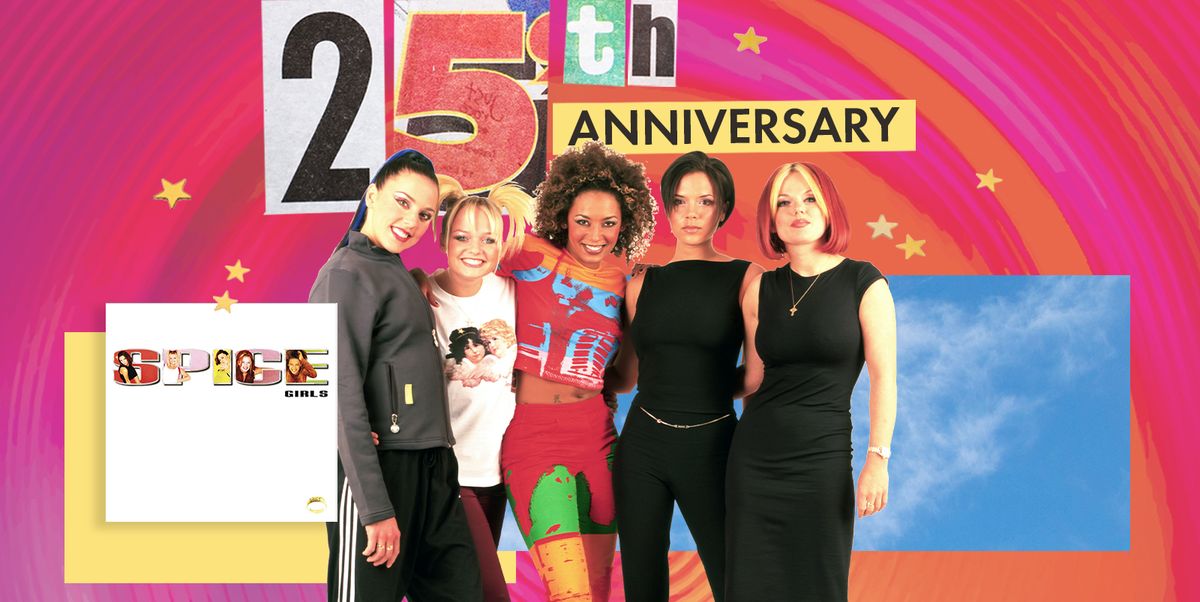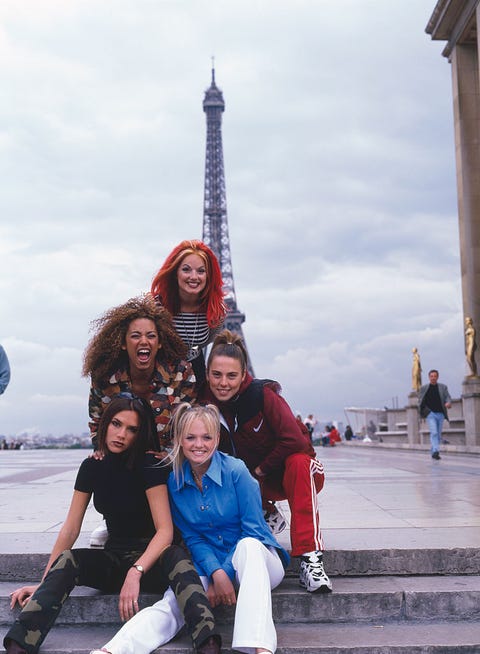Products You May Like
When the Spice Girls emerged in the mid-aughts, the state of pop music changed forever. Before 1996, the music landscape had been largely dominated by alternative rock and rap, with music fans worshipping its respective idols, Kurt Cobain and 2Pac. But when five young women from the U.K. debuted the candy-coated empowerment anthem “Wannabe,” they transformed a genre and an entire generation with their “girl power” ethos.
Formed in 1994 by way of an ad in a trade magazine, Geri Halliwell, Melanie Brown, Melanie Chisholm, Emma Bunton, and Victoria Adams became the Spice Girls, a “manufactured” girl group that was meant to compete with British boy bands like Take That and 5ive. “Wannabe” was just the beginning. When the band released their debut album Spice in 1996, it became a global sensation with perfectly crafted pop ditties—like “Who Do You Think You Are” and “2 Become 1”—meant to cater to the masses. And they did: The album’s perky radio hits, bratty lyrics, and shameless fantasizing ignited a resurgence of “Beatlemania”—except this time it was “Spicemania.” They’ve since kept their seat warm as one of the best-selling girl groups of all time.
The success of the Spice Girls is directly intertwined with the band’s brand of commercial pop-feminism, which has been their calling card since day one. “Wannabe” may have been a surefire hit, but it was also a mission statement of self-assuredness aimed at the male gaze: “If you wanna be my lover, you gotta get with my friends.” The words, though catchy, weren’t revolutionary, but they became part of a meticulously crafted media package that came with selling Pepsi and Chupa Chups (and even a movie). Their message was sold not only through their music, but also through commerce. Sure enough, it worked: The group became the faces of the mainstream “girl power” movement. Though, the concept wasn’t exactly new: the Riot Grrrl wave had been brewing in underground punk scenes in the early 1990s, but it didn’t necessarily land with every music fan. “I was a little young for Riot Grrrl when it was at its height but the messages from that movement impressed upon me that the idea of having feminism sold to you as a commodified idea or slogan was a huge amount of bullshit,” says Courtney Smith, a music writer. “At the time, it struck me that that was exactly what the Spice Girls were doing.”
But the Spice Girls were delivering the message in an accessible way—preaching sexual liberation, embracing individuality, and unwaveringly supportive female friendship. (“Friendship never ends” is a memorable line in the “Wannabe” chorus.) Longtime fan Rachel Brodsky found it easy to forget that the band didn’t, in fact, meet and form organically. “I think their genuine rapport, love, and support for each other helped shape the way I view female friendship.” The Spice Girls even became a universal support system for their fans, especially ones who felt like they were alone. “I was a tomboyish girl, and one of the few Black girls in my grade at Catholic school, and the idea of having a girl gang who looked out for each other was very appealing,” says Candice Watson, another fan.
Even if the “girl power” mantra was gimmicky, it still exposed a generation of young people to the concept of feminism. “It was my first lesson in feminism, the first time someone named it and made it tangible, the first time I was proud to be a girl,” says Toronto-based writer Sonja Cori Missio.
Part of that was due to the Spice Girls’s range of identities, tailored to each member’s femininity, which helped their audience feel seen in different ways. For fans, Posh (Adams, now Beckham) embodied sophistication and glamour while sporting black mini dresses; Baby (Bunton) touted pigtails, innocence, and an affinity for the color pink; Scary (Brown) was bold, fun, and a fashion risk-taker; Ginger (Halliwell) was the bubbly leader-type who loved Union Jack-emblazoned looks; and Sporty (Chisholm) embraced being a tough tomboy who opted for tracksuits and crop tops over dresses. The message? Femininity wasn’t one-dimensional. Writer and comedian Greg Mania says the Spice Girls gave him “permission to be feminine.” “I was able to carve a space for myself—and my femininity, along with the other things that I recognized made me different, but could not yet explain why—within their music, videos, performances, and, of course, masterpiece of a movie,” he said. “I understood, on some visceral level, that their message of ‘girl power’ included me too.”
For many pop music fans in the LGBTQ+ community, the Spice Girls were instrumental in helping them embrace their authentic selves—whether it was through the vulnerability of their lyrics, their campiness, or their unadulterated joy. Yann Hatchuel, who heard the group for the first time at seven years old, called the experience “a revelation.” “I was bullied for being gay, even though at that age I actually didn’t even know what gay was,” he says. “The constant bullying had made me shy and anxious, but the Spice Girls changed that. I felt confident to embrace who I wanted to be.” Khaaliq “Leek” Crowder loved seeing a Black woman “take up space at the pop music table,” and the group helped him embrace being “a proud, feminine gay man.” He says, “Scary Spice taught me that it’s okay to be energetic, to show off your big personality and beautiful smile.” The Spice Girls were aspirational: They represented a fantasy of being who you are with no limitations. “I gravitated to the Spice Girls because I saw in them what I wanted to be but couldn’t because I was painfully shy at 13—athletic, fashionable, sassy, cute, and loud,” says Jill Marino, a fan. There was power in how the members embraced their personas, and that same confidence resonated with their listeners.
The Spice Girls’s legacy is seemingly endless. But most significantly, their formula changed the pop landscape, proving there was interest in girl groups and that there was value in targeting a female fanbase with candor. They laid the sonic blueprint for empowering pop music, which is echoed throughout today’s most popular and outspoken artists. It’s impossible not to think of the Spice Girls’s impact when you hear Dua Lipa’s escapist breakup anthem “New Rules” or see Charli XCX’s hands-on approach to transforming the genre. It’s very possible that Girls Aloud, The Pussycat Dolls, Fifth Harmony, or Little Mix wouldn’t exist without the Spice Girls. Whether or not you subscribed to the “girl power” messaging that the British pop group sold, it birthed a generation of “go-getting,” boundary-pushing women who aren’t afraid to do what they (really, really) want.
This content is created and maintained by a third party, and imported onto this page to help users provide their email addresses. You may be able to find more information about this and similar content at piano.io

![Spice - 25th Anniversary [2 CD]](https://hips.hearstapps.com/vader-prod.s3.amazonaws.com/1635532033-51dcU3revNL._SL500_.jpg?crop=1xw:1xh;center,top&resize=480%3A%2A)
